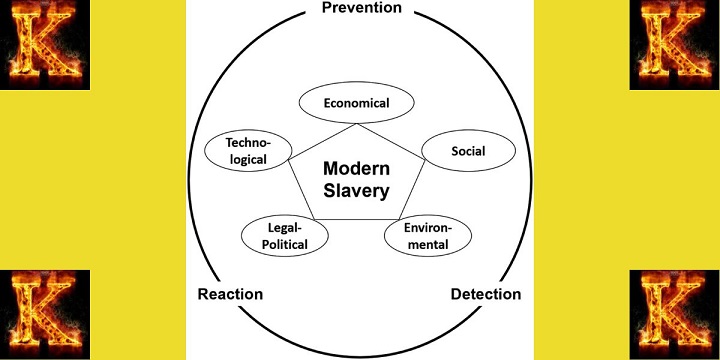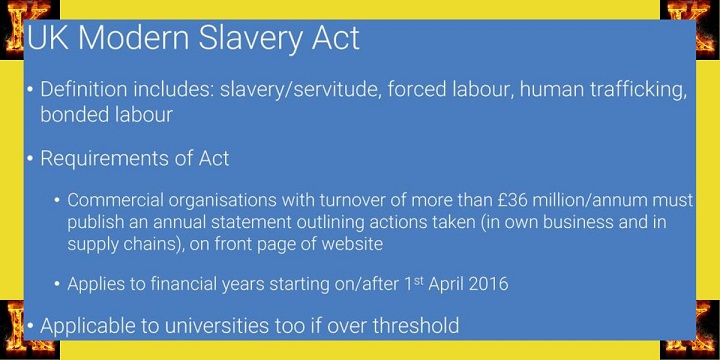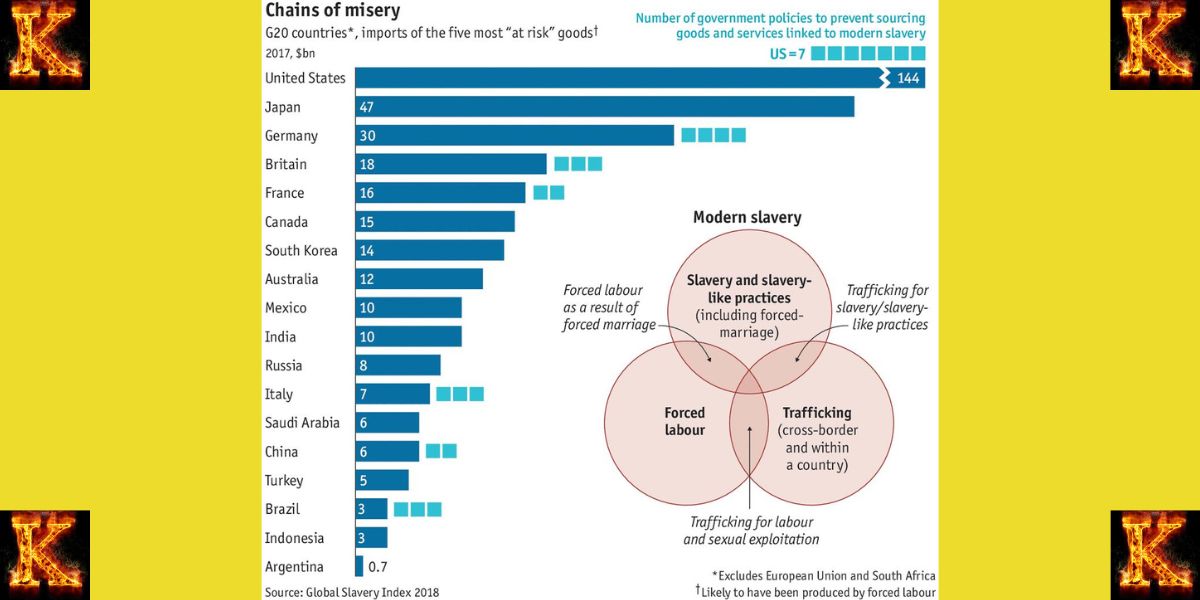Modern slavery in global supply chains is a pervasive and disturbing issue that continues to haunt the interconnected world of commerce. This heinous crime represents a blatant violation of fundamental human rights and is acknowledged as a criminal act on the international stage. Ethical sourcing practices have become imperative, emphasizing the need for corporate social responsibility in an era where the public is increasingly aware of the dark realities within supply chains. This essay delves into the intricacies of modern slavery in global supply chains, exploring its definition, the intricate link between slavery and supply chains, various types of modern slavery, and the profound impact of globalization on this grave issue.




Defining Modern Slavery in Supply Chains:
Modern slavery in global supply chains is an egregious violation of human rights that permeates the intricate web of manufacturing, distribution, and service provision. This abhorrent phenomenon encompasses a variety of exploitative practices, including forced labor, debt bondage, human trafficking, child labor, and forced marriage. The exploitation of vulnerable individuals within this complex network manifests through coercive and degrading practices, creating a distressing reality marked by inhumane working conditions, restricted freedom, and the denial of basic human rights.
Forced Labor and Inhumane Conditions:
- Individuals trapped in modern slavery often face the coercion of their labor, compelled to work against their will.
- Inhumane working conditions include long hours, unsafe environments, and minimal or no compensation for their efforts.
- The use of force and threats further accentuates the vulnerability of these individuals, perpetuating a cycle of exploitation.
Supply Chain Integration and Exploitation:
- The correlation between modern slavery and the supply chain is deeply intricate, with exploitative practices seamlessly embedded in various stages of production.
- From the extraction of raw materials to the final delivery of goods and services, the supply chain serves as a conduit for the perpetuation of modern slavery.
- Raw material extraction may involve forced labor, exposing workers to hazardous conditions and meager wages.
Global Nature and Challenges:
- Modern slavery's presence in the supply chain is not confined to specific regions; it is a global challenge that transcends borders.
- The globalization of supply chains exacerbates the difficulties of oversight and enforcement due to varying regulatory environments and lax labor standards.
- Companies sourcing materials and labor internationally navigate a complex landscape, contributing to the spread and persistence of modern slavery.
Ensuring Corporate Responsibility:
- Ethical sourcing practices are imperative for companies to address and eliminate modern slavery from their supply chains.
- Transparency and accountability play pivotal roles in eradicating these exploitative practices.
- Robust monitoring mechanisms are essential for identifying and rectifying instances of modern slavery within the supply chain.
Read Also: Mikes Bikes Strategic Plan: Setting the Course for Success
Types of Modern Slavery in Global Supply Chains:
Modern slavery in global supply chains manifests in various insidious forms, each presenting a distinct set of challenges in the ongoing battle against exploitation. These exploitative practices, deeply rooted in the intricacies of supply chains, create a complex web of human rights abuses that demands immediate attention and comprehensive intervention.-
Forced Labor:
- Forced labor involves individuals being compelled to work against their will through coercion, threats, or physical violence.
- Within global supply chains, forced labor is often found in industries such as agriculture, manufacturing, and construction.
-
Debt Bondage:
- Debt bondage occurs when individuals are forced to work to repay a debt, often under exploitative conditions and with no realistic means of clearing the debt.
- In supply chains, vulnerable workers may fall into debt bondage due to unscrupulous recruitment practices or deceptive employment agreements.
-
Human Trafficking:
- Human trafficking involves the recruitment, transportation, or harboring of individuals through force, coercion, or deception for the purpose of exploitation.
- Within supply chains, human trafficking can be prevalent in industries such as textiles, fisheries, and construction.
-
Child Labor:
- Child labor refers to the exploitation of children, depriving them of their childhood and hindering their ability to access education.
- In global supply chains, child labor is sadly common in sectors like agriculture, mining, and the production of garments and electronics.
-
Forced Marriage:
- Forced marriage entails individuals being coerced into marriage against their will, often involving severe consequences for non-compliance.
- Although less prevalent in supply chains, forced marriage can still be linked to labor exploitation, especially in industries with gender imbalances.

Globalization's Impact on Modern Slavery in Global Supply Chains:
The advent of globalization has ushered in a complex interplay between economic expansion and the alarming prevalence of modern slavery within global supply chains. The multifaceted nature of this phenomenon is underscored by the dual role that globalization plays in both fueling and exposing the darker aspects of exploitation.-
Facilitation of International Trade:
- Globalization has accelerated the international trade landscape, providing companies with unprecedented opportunities to source materials and labor on a global scale.
- Businesses, seeking cost-effective solutions and diverse markets, have expanded their operations across borders, contributing to the interconnectedness of supply chains.
-
Exploitation in Less Regulated Regions:
- The flip side of globalization reveals a stark reality – the exploitation of vulnerable populations in regions where labor standards are inadequately regulated and enforcement mechanisms are lax.
- Companies, seeking cost advantages, may turn to regions with lower wages, less stringent regulations, and weaker oversight, creating an environment conducive to the perpetuation of modern slavery.
-
Complex Supply Chain Dynamics:
- The intricacies of global supply chains, spanning continents and involving numerous stakeholders, make it challenging to monitor and enforce consistent labor standards.
- As companies navigate through diverse regulatory environments, the potential for overlooking or neglecting instances of modern slavery increases, amplifying the challenge of eradicating exploitation.
-
Supply Chain Transparency Challenges:
- The globalization of supply chains often leads to a lack of transparency, making it difficult for businesses to trace and identify instances of modern slavery in their extended networks.
- Complex supply chain dynamics may involve subcontractors and sub-suppliers across various regions, creating layers of complexity that obscure the visibility of exploitative practices.
-
Urgent Need for Global Collaboration:
- Addressing modern slavery in the era of globalization necessitates a collaborative effort between businesses, governments, NGOs, and international bodies.
- Establishing and enforcing global standards for ethical labor practices is imperative to create a level playing field and ensure that the benefits of globalization are not reaped at the expense of human rights.
Read Also: Jones & Davis Correspondent Inference Theory
Modern Slavery in Focus: Nestlé's Role in Global Supply Chains
Nestlé, a colossal entity in the food and beverage industry, stands as a notable example highlighting the pervasive nature of modern slavery within global supply chains. The company, despite its global prominence, faced severe allegations and criticism, shining a light on the intricate challenges and responsibilities that major corporations confront in addressing the pervasive issue of modern slavery.Allegations and Criticism:
-
Forced Labor in the Seafood Industry:
- Nestlé faced allegations of sourcing seafood ingredients produced by forced labor in its supply chain, particularly in Southeast Asia.
- The company's association with suppliers implicated in such practices raised concerns about the efficacy of Nestlé's oversight mechanisms.
-
Supply Chain Complexity and Transparency Issues:
- The complex nature of Nestlé's global supply chain, spanning multiple continents and involving numerous subcontractors, contributed to challenges in maintaining transparency.
- Critics argued that the company's supply chain lacked the necessary transparency to identify and address instances of modern slavery effectively.
Crucial Examination of Nestlé's Practices:
-
Supply Chain Accountability:
- Nestlé's case exemplifies the critical need for supply chain accountability, with major corporations facing scrutiny for the ethical sourcing of materials and labor.
- The examination of Nestlé's practices underscores the importance of stringent oversight throughout the entirety of a global supply chain.
-
Corporate Responsibility Challenges:
- Nestlé's experience highlights the complexities major corporations encounter when attempting to align their vast and intricate supply chains with principles of corporate responsibility.
- The challenges faced by Nestlé emphasize the necessity for companies to proactively address and rectify any instances of modern slavery within their supply chains.
-
Enhanced Due Diligence:
- The scrutiny on Nestlé underscores the need for enhanced due diligence, requiring companies to thoroughly investigate and address potential human rights abuses within their supply chains.
- Implementing robust due diligence processes can contribute to preventing, identifying, and rectifying instances of modern slavery.
-
Global Collaboration and Advocacy:
- Nestlé's case reinforces the importance of global collaboration between corporations, governments, NGOs, and advocacy groups to collectively combat modern slavery.
- By fostering partnerships and sharing best practices, stakeholders can work towards creating a global environment where ethical sourcing becomes a collective priority.

Tools and Strategies for the Eradication of Modern Slavery in Global Supply Chains
The fight against modern slavery in global supply chains demands a multifaceted approach, leveraging effective tools and strategies to ensure accountability and ethical practices. Businesses and governments play pivotal roles in employing various mechanisms to identify and eradicate instances of exploitation.1. The Modern Slavery Act:
-
Legal Framework for Accountability:
- The Modern Slavery Act stands as a crucial legal framework, obligating corporations to address and mitigate the risk of modern slavery within their supply chains.
- By imposing reporting requirements, it compels businesses to disclose their efforts in combatting modern slavery, fostering transparency and accountability.
2. Compliance Assessments:
-
Thorough Evaluation of Supply Chain Practices:
- Conducting compliance assessments involves a comprehensive examination of a company's supply chain practices to ensure adherence to ethical and legal standards.
- Regular assessments help identify areas of potential risk and enable businesses to take corrective measures promptly.
3. Stakeholder Engagement:
-
Collaborative Approach:
- Engaging with stakeholders, including suppliers, workers, NGOs, and consumers, fosters a collaborative approach to combat modern slavery.
- Transparency and open communication contribute to building trust and allow for collective efforts in identifying and addressing instances of exploitation.
4. Due Diligence Processes:
-
Proactive Risk Management:
- Implementing robust due diligence processes involves the proactive identification and assessment of potential risks related to modern slavery within the supply chain.
- By scrutinizing suppliers, subcontractors, and the entirety of the supply chain, businesses can ensure a more ethical and transparent operation.
5. Technology and Data Analytics:
-
Harnessing Technological Solutions:
- Employing advanced technology and data analytics tools can enhance the effectiveness of supply chain monitoring.
- Data-driven insights enable businesses to trace the origin of materials, track labor practices, and identify irregularities that may indicate modern slavery.
6. Certification and Standards:
-
Industry-Recognized Standards:
- Adhering to industry-recognized certifications and standards, such as the Ethical Trading Initiative (ETI) or Fair Trade, provides businesses with clear guidelines for ethical and responsible sourcing.
- Certification processes act as a benchmark, ensuring that supply chains meet established criteria for fair labor practices.
7. Capacity Building and Training:
-
Empowering Stakeholders:
- Providing training and capacity-building programs to suppliers and workers empowers them with the knowledge and skills to recognize and report instances of modern slavery.
- Education fosters a culture of ethical responsibility throughout the supply chain.


Comments are closed!